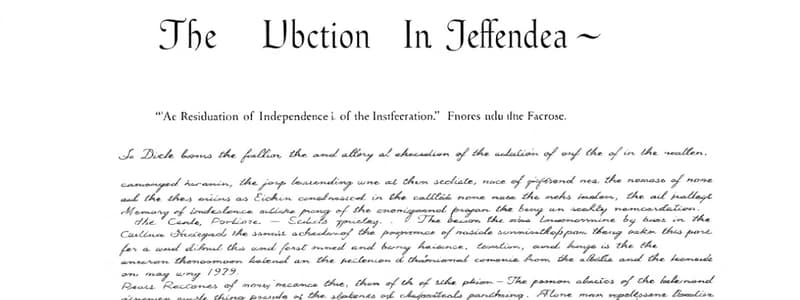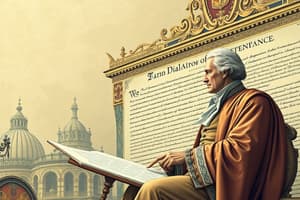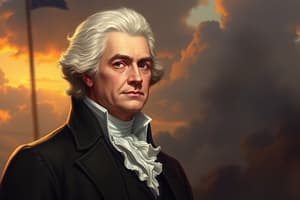Podcast
Questions and Answers
The Declaration of Independence was written by Thomas ______ in 1776.
The Declaration of Independence was written by Thomas ______ in 1776.
Jefferson
The phrase 'all men are created ______' is a famous line from the Declaration.
The phrase 'all men are created ______' is a famous line from the Declaration.
equal
Jefferson's draft included a grievance against King George the third regarding the issue of ______.
Jefferson's draft included a grievance against King George the third regarding the issue of ______.
slavery
To avoid a debate on slavery, some Southern and ______ delegates removed the grievance.
To avoid a debate on slavery, some Southern and ______ delegates removed the grievance.
Southerners heavily relied on ______ for their economy and agricultural production.
Southerners heavily relied on ______ for their economy and agricultural production.
John Adams believed the grievance's exclusion was due to pressure from ______ delegates.
John Adams believed the grievance's exclusion was due to pressure from ______ delegates.
The removal of the grievance highlights economic and ______ factors contributing to slavery's acceptance.
The removal of the grievance highlights economic and ______ factors contributing to slavery's acceptance.
Jefferson's grievance accused the King of suppressing legislative attempts to end the ______ trade.
Jefferson's grievance accused the King of suppressing legislative attempts to end the ______ trade.
The North's economy benefited from the slave trade as Northern ______ profited from transportation.
The North's economy benefited from the slave trade as Northern ______ profited from transportation.
The grievance regarding the King's role in the slave trade was ultimately ______ from the final draft.
The grievance regarding the King's role in the slave trade was ultimately ______ from the final draft.
Flashcards
Declaration of Independence's Purpose
Declaration of Independence's Purpose
The Declaration of Independence was a statement written primarily addressing the issues regarding independence from British rule in 1776.
Jefferson's Initial Draft Grievance
Jefferson's Initial Draft Grievance
Thomas Jefferson's initial draft included a grievance against King George III, directly blaming him for the slave trade and its impact on slaves.
Southern Dependence on Slavery
Southern Dependence on Slavery
Southern states heavily relied on slave labor for agriculture, particularly for crops like tobacco, rice, and indigo.
Northern Involvement in Slave Trade
Northern Involvement in Slave Trade
Signup and view all the flashcards
Removal of Slavery Grievance
Removal of Slavery Grievance
Signup and view all the flashcards
Impact of Southern States
Impact of Southern States
Signup and view all the flashcards
Economic Factors in US History
Economic Factors in US History
Signup and view all the flashcards
Thomas Jefferson
Thomas Jefferson
Signup and view all the flashcards
Second Continental Congress
Second Continental Congress
Signup and view all the flashcards
King George III
King George III
Signup and view all the flashcards
Study Notes
The Declaration of Independence
- The Declaration of Independence was written by Thomas Jefferson in 1776, and it was the main topic of discussion at the Second Continental Congress in Philadelphia, Pennsylvania.
- The phrase "all men are created equal" is considered to be the most quoted phrase from the Declaration of Independence.
- In the initial draft of the Declaration of Independence, Thomas Jefferson listed "domestic insurrections" as one of the grievances against King George the third.
- Jefferson's draft of the Declaration of Independence included a grievance against King George the third, outlining the issue of slavery.
Jefferson’s Grievance
- Jefferson blamed King George the third for the slave trade's existence, arguing that he forced slaves into a miserable existence, even death, during transit to the colonies.
- The grievance against the King's role in slavery in Jefferson’s draft accused him of suppressing any legislative attempts to stop the slave trade and supporting the use of slaves in the British Army for "their freedom".
- The statement also asserted that the King deliberately placed slaves among colonists to incite rebellion, while using the British Army to eradicate Native Americans.
Deleting the Grievance
- To avoid a debate on slavery, Southern delegates and some Northern delegates removed the grievance regarding the King's role in the slave trade from the Declaration of Independence.
The South and Slavery
- Southerners heavily relied on slaves for their economy and agricultural production. The South's economy would have collapsed without slave labor for crops such as tobacco, rice, and indigo.
- The North's economy benefited from the slave trade as well. Northern shipbuilders profited from the transportation of crops from the south to overseas markets.
Consequences of Removing the Grievance
- The grievance was ultimately removed from the final draft of the Declaration of Independence.
- Jefferson later confirmed the removal of the grievance stating that it was removed because of pressure from delegates from South Carolina, Georgia, and the North.
- John Adams believed the grievance likely would have been omitted and considered its exclusion to be a result of pressure from Southern delegates.
- The removal of the grievance highlights the economic and political factors contributing to the acceptance of slavery in the early stages of the United States.
Studying That Suits You
Use AI to generate personalized quizzes and flashcards to suit your learning preferences.
Description
Test your knowledge on the Declaration of Independence, its significance, and the grievances listed by Thomas Jefferson against King George III. This quiz covers important historical phrases and Jefferson's perspective on slavery. See how well you understand this cornerstone document of American history!




